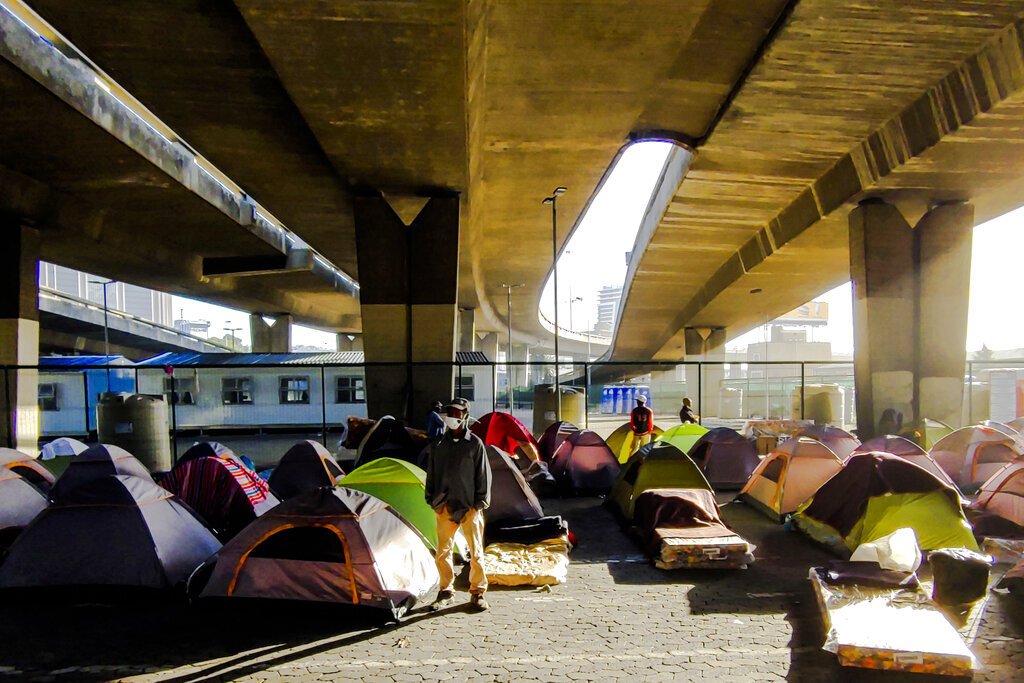In South Africa, Old Habits Die Hard
Unhoused people living in tents under a bridge in Cape Town, South Africa, in May 2020. [AP Photo]
Not having stable housing is difficult enough. But many unhoused South Africans also have to worry about the people who are supposed to protect them.
More than 14,000 people live on the streets of Cape Town, where they are 11 times more likely to be arrested than the general population, according to a 2020 report. This isn’t because unhoused people are more likely to break the law, but rather, because police are more likely to interpret laws in ways that will render them as criminals.
Sometimes, the stakes can be life or death. Earlier this month, City of Cape Town law enforcement killed an unhoused man during an attempt to police a settlement.
Ndifuna Ukwazi, a nonprofit activist organization and law center in Cape Town, has spent the past three years fighting for the rights of unhoused people to exist in public. The experiences of the city’s growing homeless communities reflect those of people around the world who’ve lost their jobs and homes as a result of the economic fallout of the pandemic.
Last month, I spoke with Danielle Louw, an attorney for Ndifuna Ukwazi, who described the organization’s efforts to defend its clients. She also broke down how Cape Town’s history of colonialism and apartheid informs its treatment of unhoused people today, and what a more humane approach might be.
The policing of unhoused people is a racist history repeating itself
In 2019, it came out that Cape Town’s Displaced People’s Unit – a unit separate from its metropolitan police, though they are sometimes involved – was using bylaws intended to control littering and noise levels to harass, intimidate and issue fines to people living on the street. (Unlike national laws, bylaws are created and enforced by municipalities, and only apply within that municipality.)
Under one bylaw, it’s a crime to beg, put up a shelter, or camp overnight in a public place. Though other South African cities have similar regulations, Cape Town is especially strict in enforcing them, Louw said, and law enforcement members often issue fines ranging from 200 to 2,000 rand ($13 to $130).
The existence of these bylaws reflects the city’s racist history. In 1809, British colonial authorities introduced vagrancy laws to what is now present-day South Africa that required Indigenous South Africans to carry documentation from their masters if they wanted to move from their “fixed place of abode.”
“The British government conflated nomadic lifestyle with a lack of civility,” Louw said, emphasizing that it was nearly impossible for Native South Africans to purchase land at the time. Then, during apartheid, pass laws required Black South Africans to carry passbooks when traveling.
“At root, these laws were there to control the Black and Indigenous populations. And now we see the disturbing artifacts of those colonial and apartheid laws in Cape Town bylaws,” Louw said.
Representing unhoused people against the city
Even though the Western Cape Town High Court effectively prohibited the city from using its bylaws to harass or intimidate unhoused people in a 2019 ruling, this doesn’t seem to have stopped law enforcement.
Currently, Louw is working on two cases that have to do with the evictions of unhoused people in public places. One case is awaiting judgment. In the other, the Western Cape High Court has already ruled in favor of 46 people who were evicted from a public parking lot and had their possessions seized. As part of its ruling, the court ordered the city to return tents, materials and other property to Louw’s clients. But this was put on hold five days later, when the city filed a notice of appeal.
“When we broke the news to the District 6 clients, it was tears and joy and a feeling of vindication that we do matter, and that the city can't just do whatever they want with us,” Louw said, pausing. “And then to hear they're appealing.” Many of her clients, she added, are frustrated with “the broader system of law and how the city operates.”
Solutions beyond policing and shelters
Ndifuna Ukwazi is working to change the bylaws, but it has been an uphill challenge. Last September, officials gave law enforcement officers the power to physically relocate individuals on the street and to arrest anybody who refuses an offer of shelter. This goes hand in hand with the city’s current approach to the unhoused, in which a social worker is expected to “engage” with a person at least six times in an effort to convince them to join the shelter system. If the offer is not accepted, the person will be given a compliance notice, which can lead to a fine, a court summons and an arrest warrant.
This system exemplifies how much “the city needs to develop trust between its officials and people on the street,” Louw said.
Instead of putting people in shelters or criminalizing them, Louw and Ndifuna Ukwazi believe that the city should take vacant offices and commercial buildings and turn them over to organizations focused on working with unhoused people. This includes Rainbow House, a transitional program that takes a harm reduction approach to substance use disorders, and Rehoming Collective, a housing- and employment-focused organization run by people who have experienced homelessness. Converting buildings would give people a place to live, and be cheaper than starting a new development.
In the meantime, living on the street may feel more comfortable than staying in the city’s shelter system, which Louw said clients have described as a prison. “There are more law enforcement offices than there are social workers,” she said, adding that her clients “don't want to be taken to a safe space to live on a night-by-night basis.” Regardless of whether they’re staying in parking lots or tennis courts, she noted, “they've created homes for themselves. ... They have created a community.”





